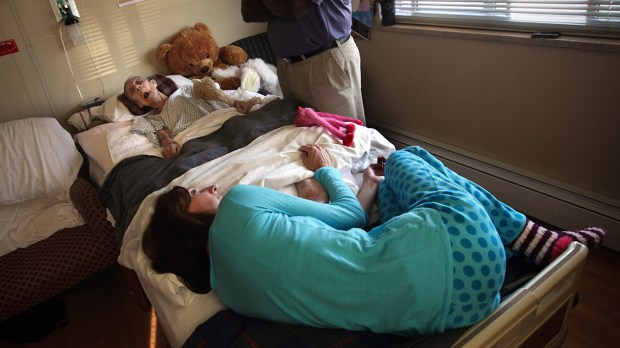No suffering goes unused. Here I don’t mean the suffering we offer up for another. I mean that in some way we’re being trained. Our suffering gets used in this world, and that’s a blessing that makes our losses a little easier to bear.
Last night I was sitting in our living room late in the evening, fixing someone’s prose, when an email arrived from a friend. He’s usually amusing, and fixing prose isn’t, so I opened his message.
He was writing from a hospice. One of his closest friends had just gone in, after three and a half years fighting aggressive brain cancer. He asked for advice on how to accompany his friend on his journey. He apologized for bringing up a painful subject, but he really needed help.
The long night at the hospice
I thought back three months to that long night at the hospice sitting by my sister’s bed. It came at the end of six months, spent mostly with her. I wrote about that last day and night here. It was painful beyond belief.
It gave me something to say to my friend, something I could say with authority. When my sister was dying, and for a while afterward, people told me all sorts of things, meaning to help and comfort. I got lots of advice along with the sympathy. They meant well, and I usually saw the truth of what they were saying, but I still wanted most of them to shut up, or shut up and go away.
Some made it sound easy, but that was only part of the problem. Even when they saw the pain, many were talking of something they did not know. They might have been telling the truth, but it was a second- or third-hand truth.
Those who had suffered the same way rarely said much. They knew already what I was learning. They spoke with authority the few words they spoke. Even their simple “I’m so sorry” meant a lot, because they’d been there.
They spoke in solidarity, as comrades, as fellow veterans. I felt we were standing shoulder to shoulder in battle. None of them spoke as if they had an answer. They didn’t have to say much, though what they said was always helpful. Their understanding was enough.
The message back
Of course, I wrote my friend back right away. Here’s what I told him.
People going through this kind of thing often want a magic answer, a technique or a trick of the trade, something to do that will actually help. I knew that from experience. I also knew there isn’t one.
My answer isn’t dramatic and might not feel satisfying, I wrote. But the best thing to do to accompany him is just to accompany him.
I said that in my experience and in what I’d learned from others, the dying move on as they’re getting closer to death. They don’t want anything from us, they don’t want us to lecture them, they don’t want to engage with us. We may want the Big Talk, but they don’t. There’s nothing we can do (except for practical help) but be with them. That’s what my sister wanted.
I told my friend about the end. My wife and I took turns sitting with Karen her last two days. That’s all she wanted. She didn’t want to talk. There’s really nothing you can say anyway. Most people don’t want to hear pieties, even or especially if they believe them.
Then I sat with her during the last evening after she’d clearly taken a turn for the worse, till she decided she wanted to go to the hospice. When we got there about 10:00, she was already asleep. We prayed the In paradisum over her and then I sat with her through the night. Hope slept, fitfully, on the couch.
I held my sister’s hand and occasionally sang to her — perhaps mostly for my benefit, although some experts say the dying hear you even when you think they’re sleeping. Maybe because I’d heard it on the radio that day, the first verse and the chorus to Neil Young’s “Long May You Run” I sang many times. I don’t know what a “chrome heart” is, but “your chrome heart shining in the sun, / Long may you run” seemed right for her.
I talked to her from time to time. I prayed many decades of the rosary. I cried a lot.
Just be there
My being there the last few days was important to her. I pray that my presence at the hospice after she fell asleep meant something to her as well, though I won’t know till the next world.
But just be there. That’s huge.
That’s what I wrote my friend and he found it helpful. The suffering of that last day with my sister proved useful to someone who needed to hear from a veteran. That makes it easier to bear, when so much of life conspires to remind you of the pain. Your suffering doesn’t go unused. You’re being trained.

